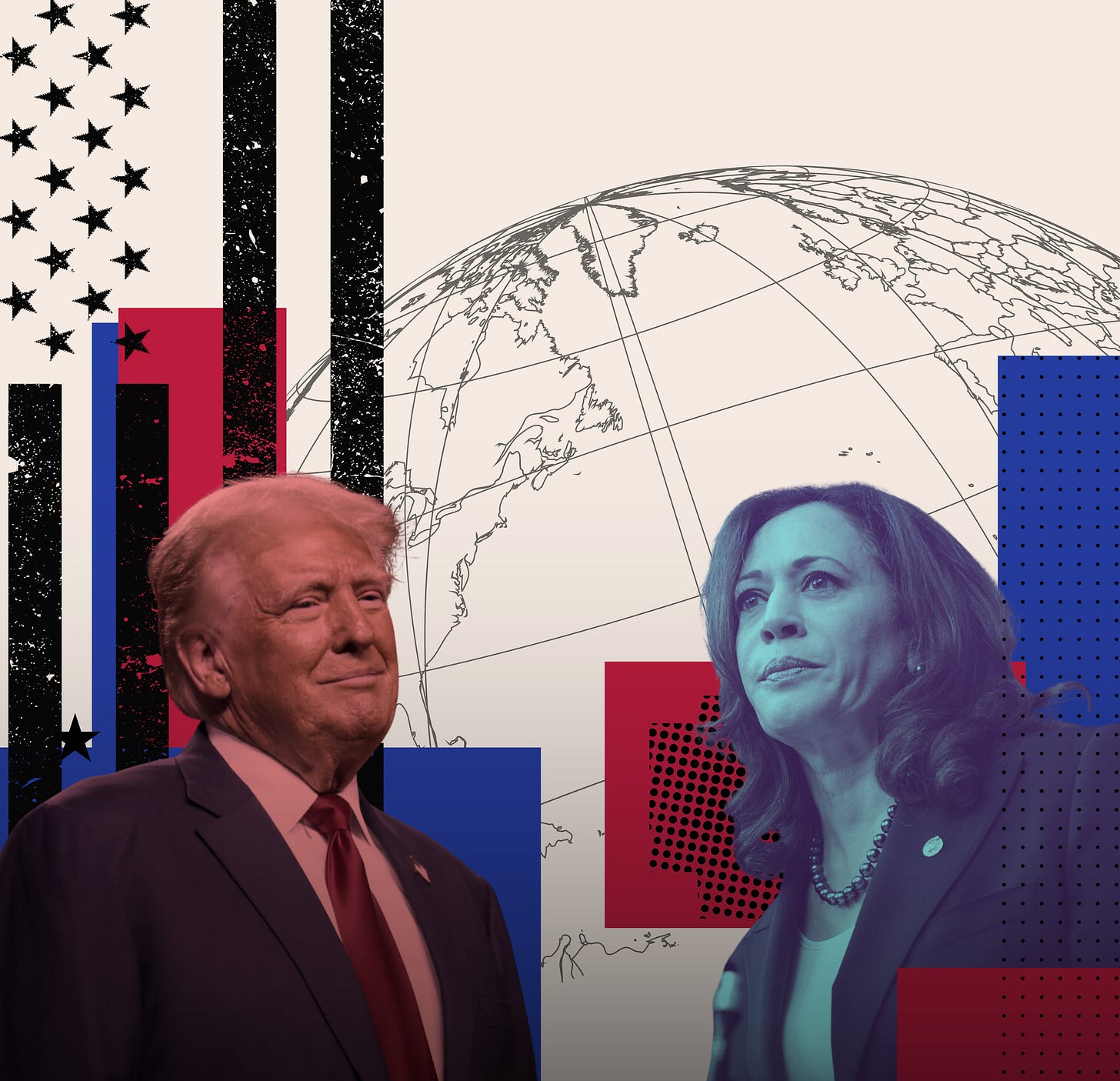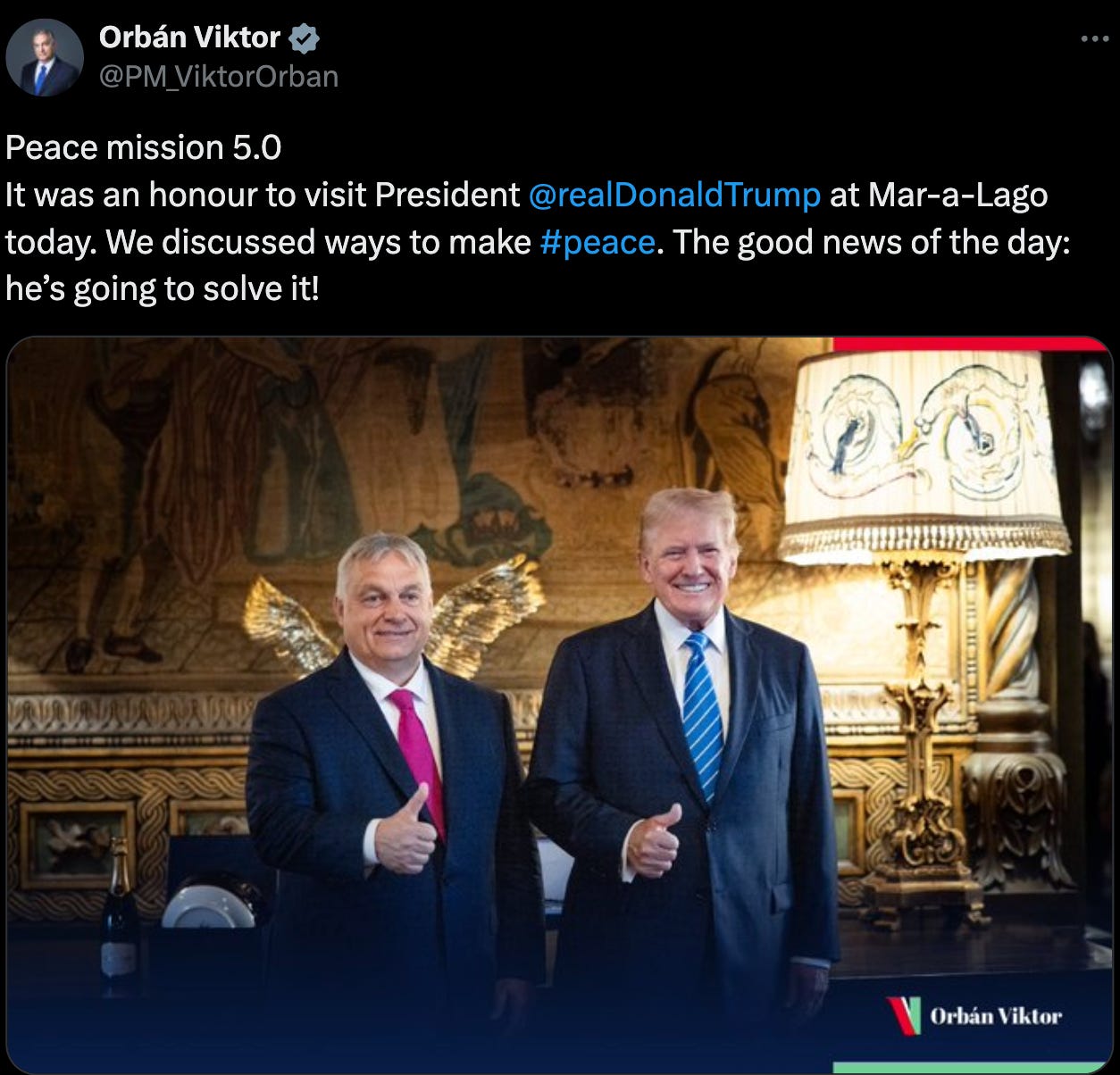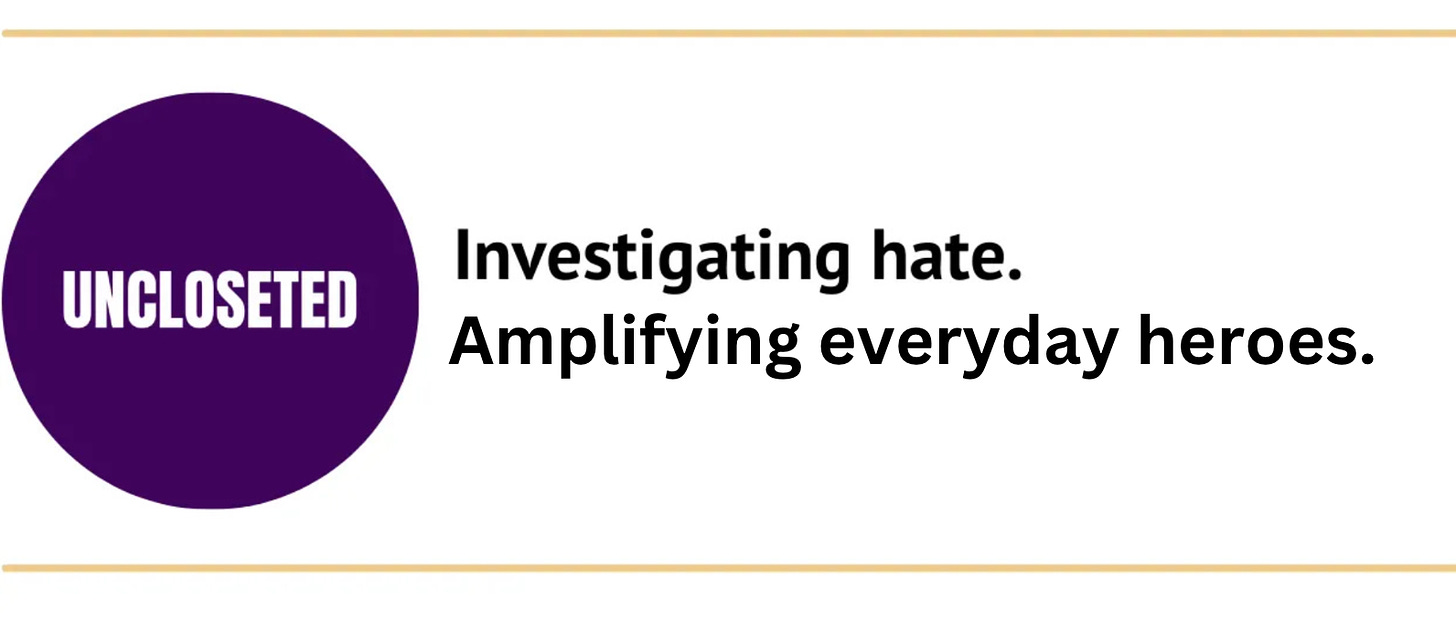The World Is Watching: How the Results of the U.S. Election Could Affect LGBTQ People Around the World
Uncloseted Media spoke with dozens of folks from around the globe to learn about the various ways a Trump or Harris presidency could affect LGBTQ rights in their home countries.

As we approach what many Americans view as the most consequential election in recent history, the world is watching with bated breath. Who will take the baton from Joe Biden for the next chapter of U.S. history?
“For better or worse, the U.S. plays an outsized role in shaping global politics, and in many cases what happens directly in any number of countries around the world,” Ari Shaw, a Senior Fellow and the Director of International Programs at the Williams Institute, told Uncloseted Media. “People outside of the U.S. are deeply attentive to and invested in what happens with the election. In some cases, especially for queer people, it could mean the difference between waking up, feeling safe and secure and waking up feeling like there's a new sort of landscape of threats and challenges ahead.”
Uncloseted Media spoke with folks from around the globe to hear about their hopes and fears ahead of the U.S. election. Who do they want to win and why? And how could the results impact LGBTQ rights in their home countries? Here are the takeaways:
1. The U.S. is still seen by many as a bastion for LGBTQ equality
Because the U.S. has outsized influence on the global stage, it can influence the norms for where other countries land on LGBTQ rights. “When the U.S. [legalized] marriage equality [in 2015], that did help legitimize it in the global community,” says Kristopher Velasco, an Assistant Professor of Sociology at Princeton University. When a modern state recognizes marriage equality, Velasco says other countries take notice that this is what it takes to be seen as a state “that recognizes human rights.”
“By most measures, President Joe Biden has been the most pro-LGBTQ president in history, both domestically and at the international level. From day one he explicitly centered the advancement of LGBTQ rights through U.S. foreign policy,” says Shaw. “And that was something we had never seen by any president.”
Because of this, the U.S. is still viewed by many nations on the global stage as a haven of equality and progress, and especially to those living in the 64 countries that criminalize homosexuality.
One man who lives in eastern Turkey, where President Tayyip Erdogan does not “recognize LGBT,” told Uncloseted Media he fears violence if he expresses his homosexuality. “I am afraid they will start hunting us gay people. I'm afraid that someone will r*pe or kill my boyfriend on the road just because he's gay.”
“I don't know where you live and what kind of life you have, but let me tell you this, being able to hold his hand outside, leaning [my] head on his shoulder, kissing him even on the cheek, I would love to be able to do these things just once.”
The man, who spoke on the condition of anonymity for safety reasons, says it “does not matter” who is elected, because gay people in developing nations suffer no matter what happens. “I wish I could live in America and live my sexual identity more comfortably.”
2. If Trump wins, people are worried about the ripple effects of his rhetoric and anti-LGBTQ policies
While many international LGBTQ folks would give anything to live in the U.S., others are afraid that—if elected again—Donald Trump’s aggressive anti-LGBTQ rhetoric will spread to their country.
“Many countries look at the U.S. as an example. If we see an aggressive rhetoric towards the LGBTQ community, that’s like opening the door for the rest of the world to think that’s okay,” Felipe Corzo Duque, a 34-year-old gay man in Bucaramanga, Colombia, told Uncloseted Media. Gary, a 40-year-old gay man in Hong Kong, also says the American approach to LGBTQ issues impacts the rest of the world’s view. “I hope Kamala Harris can bring more positive influences to the country,” he says.
Velasco, whose research at Princeton focuses on how international institutions facilitate the expansion of global LGBTQ rights, looks to history to explain how this “trickle down effect” can affect queer issues abroad. He remembers in 2019 when Trump’s Secretary of State Mike Pompeo set up a commission at the State Department to redefine human rights in order to counteract a “depat[ure] from our nation’s founding principles of natural law and natural rights.” LGBTQ advocacy groups interpreted this move as an effort to undercut international progress for queer people and a ploy to revert back to a traditional definition of marriage that excluded same-sex couples.
Velasco remembers interviewing folks in Ghana, Taiwan, Israel, and Hungary who cited Pompeo’s statements and used it as justification for their anti-LGBTQ views, explaining that if “even the U.S.”—which is still viewed by many as a hyper-progressive country—is doing this, then “it is all justified.”
“And that was something that happened in the Trump administration that I very much anticipate will happen again [if he wins],” says Velasco, adding that it sets a precedent where other countries feel they can get away with rolling back LGBTQ rights and still maintain their global reputation.
“It gives legitimacy. If the quote-unquote leader of the free world is doing it, then we can do it as well and maintain our Democratic bona fides.”
Isaac, a 15-year-old trans teen living in the United Kingdom—where 61 percent of folks want Harris to win, compared to 16 percent for Trump—shares Velasco’s concerns. Trump has spent over $19 million on anti-trans attack ads and has made transphobia central to his campaign, stating numerous times that America needs to get rid of “transgender insanity.”
Isaac worries a second Trump presidency could have spillover effects in Europe and jeopardize his access to gender-affirming healthcare, which is already banned in 26 U.S. states and which Trump has suggested he would make illegal for minors. “Transphobia is going up globally, and we are all linked by the internet. Laws passed in the U.S. can inspire laws passed in the U.K.,” says Isaac.
The export of hate through the lens of Donald Trump was a common theme from many respondents, including those from some of the most progressive countries like New Zealanders Hayley Tinning and Kersha Beare-Shore and Germans Bjoern and Patrezk, as seen here:
3. LGBTQ people in developing nations are concerned about losing resources
In developing countries, there’s a fear that some policies linked to the Trump administration, such as Project 2025, could impact key resources and funding for things like HIV and STI prevention. The 920-page document states that their administration will “stop promoting policies birthed in the American culture war” such as “abortion and pro-LGBT initiatives” that are “being imposed on [African nations].”
“We're already seeing the impact of U.S.-based conservative organizations that are supporting anti-LGBTQ advocacy and mobilization in many parts of the world, but particularly in sub-Saharan Africa and Eastern Europe and Latin America,” says Shaw. “In many cases, these are individuals and organizations that have close ties to the Trump administration. And I think we're likely to see under President Trump a kind of increase in the access, in the political space, that these organizations have to kind of further support these types of anti-LGBTQ efforts in the same region.”
One man from the Central District of Botswana is rooting for a Harris presidency “because Republicans are very clear about their lack of support for LGBTQ.” In addition, he says the “U.S. is providing a lot of funding towards LGBTQ rights in Botswana and the rest of Africa so if Democrats win we are guaranteed that support but if Republicans win I'm quite sure the fund will be reduced and directed somewhere else.”
“The election affect[s] us directly and wish we could also vote. Hopefully the American people will go with a less radical leader who accepts every being in its state.”
While Velasco says the Botswanian man’s concerns are valid, he adds that the relevant funding is fractional compared to the amount of funding evangelical groups spend on anti-LGBTQ efforts globally. “It’s so much more money,” he says. For example, the Southern Poverty Law Center-designated anti-LGBTQ hate group Alliance Defending Freedom spent nearly $20 million on foreign spending between 2021-2023, compared to the $12 million President Biden’s State Department spent on global LGBTQ issues in the same time period.
Despite this, Mama Gannush, a Palestinian-American trans activist, says neither option will help folks in their homeland. “This is the first year I removed myself as a Democrat,” they told Uncloseted Media. “Democrats have over surpassed the Republicans in their support to Israeli war crimes like no other administration has done at that level. So for me, I don't see Trump as a better option for Palestinians, and neither is Kamala Harris.”
“It's a very disappointing time to be a queer person. And it's a very disappointing time to be a queer Palestinian. And unfortunately it's dishonorable to be a queer American and Palestinian at this time,” they say.
4. In conservative countries, some see Harris’ politics as too progressive
There were many LGBTQ folks who simply felt Harris was too progressive in her policies.
“She will cause wars and more hatred. If she is winning she will create a woke agenda that will create family destruction and more hatred towards the LGBTQ,” one gay man from Johannesburg, South Africa, told Uncloseted Media.
“I think the LGBTQ propaganda has already gone too far,” says another gay man in his 30s from Hong Kong. “I just want the same level of respect as a straight man, and you don’t need to mention my identity every single minute in all propaganda everywhere, that’s really too much. I wish to remain low profile.”
A third person from Mumbai, India, where the law protects and recognizes trans people only when they have undergone gender-confirmation surgeries, thinks gender-affirming care for minors and trans people competing in sports should be illegal. “Man should not participate in women's sports and neither should any of these things be taught in schools, and if Kamala comes into power these matters will only become worse. Sexual orientation should be left up for parents to teach and [only] when a child reach 21 years old,” they say. “Trump for president! Please Make America Great Again!”
Velasco worries that Trump’s rhetoric and his close ties with leaders who have aggressively anti-LGBTQ agendas could spark a “Democratic backsliding.” He cites research that illustrates that attacks on the LGBTQ community are an early indicator of the erosion of democracy at large. “Even if you don’t care about the [LGBTQ] community,” it’s still important to push back on these attacks to maintain the stability of a modern democracy, he says.

Trump has built close relationships with notoriously anti-LGBTQ leaders like Vladimir Putin, Poland’s President Andrzej Duda and Hungary’s Prime Minister Viktor Orbán, who has invoked policies that effectively ban same-sex marriage and same-sex adoption, censored LGBTQ media representation and likened the “woke movement and gender ideology” to “what Communism and Marxism used to be.” Trump has hosted private meetings with Orban at Mar-a-Lago and recently called him a “tough person” and “smart” at the presidential debate with Harris.
Two Trump-supporting Hungarian men agree with the perspectives of the more than 50% of Hungarians who do not feel that LGBTQ people should be accepted publicly in society. See more of what they had to say here:
As we inch closer to the results of the Nov. 5th election, Ari Shaw of The Williams Institute says that depending on the winner, there will be opposing implications for the LGBTQ community around the world.
“If Kamala Harris wins, I think we can expect to see a continuation of the Biden administration policies and perhaps even an expansion of the administration's support for advancing LGBTQ rights through U.S. foreign policy and development assistance,” he says. “Under a second Trump administration, I think we can expect to see in many cases the opposite.” Shaw says this includes not just a pause on the progress that has been made, “but perhaps even a number of efforts to roll back many of the gains that have been hard won by LGBTQ activists around the world.”
“I think we can also expect to see a greater affinity for and opening of space for more anti-LGBTQ rhetoric and policies that specifically target and seek to exclude and marginalize LGBTQ people in many countries around the world,” he says.
Additional reporting by Sam Donndelinger, Hope Pisoni and Abbie Thompson.
If objective, nonpartisan, rigorous, LGBTQ-focused journalism is important to you, please consider making a tax-deductible donation through our fiscal sponsor, Resource Impact, by clicking this button:






